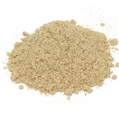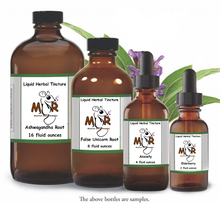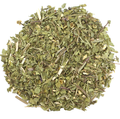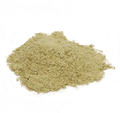 Loading... Please wait...
Loading... Please wait...- Home
- Herbal Tinctures
- Herbal Tinctures - Single Herbs
- Feverfew Tincture
Feverfew Tincture
Product Description
Feverfew Tincture
Feverfew has been found to be effective in preventing migraine headaches and/or reducing the nausea and vomiting associated with migraines. Historically this herb has been used as a treatment for inflammation, headache and as a general substitute for ailments cured with aspirin and also for toothaches, rheumatism, asthma and stomachache. The herb has been used since ancient times to lower fever and treat nervous and menstrual disorders, depression and pain. It has been used for nausea, vomiting, inducing sleep, digestion, asthma attacks, dizziness, tinnitus, arthritis, psoriasis, eczema, menstrual cramps and prostate problems. Feverfew influences the circulation of the skin, nervous system, genitor urinary organs, relieves the head of dizziness, brain, nerve pressure, hysteria and tensions of over-excitement. It has also been beneficial for colic, flatulence, general indigestion, colds, suppressed urine, expelling worms and St. Vitus Dance. Feverfew, as a febrifuge, has been used to lower fever and "cool" the body since ancient times.
This herb has undergone extensive scientific investigation. 70% of the patients in these studies report fewer attacks of migraines and less painful attacks. In several studies both the frequency and the severity of migraines was reduced among participants who took Feverfew daily as a preventative measure. Researchers believe that Feverfew prevents the spasms of blood vessels in the head that trigger migraines. It may be more effective than other non-steroidal anti-inflammatories, like aspirin. Magnesium, found in Feverfew extract, is an essential element responsible for hundreds of biochemical reactions in the body. It works to inhibit serotonin and prostaglandins, both believed to contribute to the onset of migraines. Other studies speculate that Feverfew leaf extract's high concentration of melatonin may be the factor that is effective against migraine headaches.
Taking Feverfew tincture may help to bring on the menstrual cycle. The herb has been used traditionally to regulate menstrual disorders and induces miscarriage or abortion if taken during pregnancy. This herb should be avoided you are pregnant or trying to become pregnant. By inhibiting two inflammatory substances, menstrual cramps may be eased with the use of Feverfew. While more research is required, there's no harm in starting to take Feverfew a day before you anticipate that your menstrual cramps will begin.
Rheumatoid arthritis has been found to benefit the most from the use of Feverfew. As an anti-inflammatory. It is thought to be similar to aspirin in the way it reduces inflammation. Aspirin works by blocking the production of prostaglandins, which cause inflammation, among many other functions. Feverfew works to inhibit the production of prostaglandins.
Additional benefits include lower blood pressure, reducing abdominal pain and stomach irritation. Feverfew is a mild laxative, and it is also used to help relieve gas and bloating. Feverfew has been used to stimulate appetite, and improve digestion and kidney function.
Feverfew is a mild sedative and antispasmodic that will help relieve muscle spasms. It has been used by herbalists to treat hysteria, DTs, nervousness and low spirits. It is also a stress buster, to relieve tension.
Research supports the use of Feverfew liquid extract and other herbs for treating rosacea and psoriasis. This herb's anti-inflammatory properties may help to improve certain skin problems. Feverfew has a strong and lasting odor that is considered an insect repellent. The tincture of Feverfew herb has also shown to be effective for relieving the pain and swelling caused by the bites of insects and vermin.
Nutrients: Calcium, iron, magnesium, manganese, niacin, phosphorus, potassium, selenium, silicon, zinc, vitamins A, B1, B2, B3 and C.
Ingredients: Fresh Feverfew Herb and certified grain alcohol. 1:3 Ratio
Suggested: Use 6-12 drops in juice or water, under the tongue or as desired. May be taken 3 times daily. Shake well. Store in cool dark place. Keep out of reach of children.
Precautions: Those who are allergic to daisies/ragweed/sunflowers should avoid Feverfew. People taking blood thinners (Coumadin/aspirin, etc.) should not take Feverfew, nor should it be administered to children under five years. Pregnant and nursing women should not use Feverfew. Taking Feverfew with prescription pain relievers or ibuprofen may increase the chance of side effects including upset stomach, heartburn, dizziness and ringing in the ears. Minor side effects may include gastrointestinal upset, diarrhea and nervousness.
Disclaimer: The information presented herein by Mountain Maus Remedies is intended for educational purposes only. These statements have not been evaluated by the FDA and are not intended to diagnose, cure, treat or prevent disease. Individual results may vary, and before using any supplements, it is always advisable to consult with your own health care provider.
















